- Home
- Nick Hornby
Ten Years in the Tub: A Decade Soaking in Great Books Page 7
Ten Years in the Tub: A Decade Soaking in Great Books Read online
Page 7
I bought Mark Salzman’s True Notebooks a couple of months ago, after an interview with the author in this magazine. I am beginning belatedly to realize that discovering books through reading about them in the Believer, and then writing about them in the Believer—as I have done once or twice before—is a circular process that doesn’t do you any favors. You’d probably like to read about a book you didn’t read about a while back. Anyway, as the interview implied, this is a pretty great book, but, boy is it sad.
True Notebooks is about Mark Salzman’s gig teaching writing at Central Juvenile Hall in LA, where just about every kid is awaiting trial on a gang-related murder charge. Salzman’s just the right person to attempt a book of this kind. He’s empathetic and compassionate and all that jazz, but he’s no bleeding-heart liberal. At the beginning of the book, he lists all the reasons why he shouldn’t get involved in this kind of thing. They include “Students all gangbangers,” “Still angry about getting mugged in 1978,” and, even less ambiguously, “Wish we could tilt LA County and shake it until everybody with a shaved head and tattoos falls into the ocean.” Toward the end of the book, he attends the trial of the student he loves the most, listens to all the extenuating circumstances, and finds himself going to bed that night with a broken heart, just as he feared he would. However, his sadness is engendered “not because of what the legal system was doing to young people… I had to wrap my mind around the fact that someone I had grown so fond of, and who seemed so gentle, had been foolish enough to go to a movie theater carrying a loaded gun, violent enough to shoot three people with it—two of them in the back—and then callous enough to want to go to a movie afterwards.”
I don’t want to give the impression that True Notebooks is unreadable in its gray-grimness, or unpalatably preachy. It’s consistently entertaining, and occasionally bleakly funny. “How about describing a time you helped someone?” Salzman suggests to a student who is struggling for a topic to write about.
“Mm… I never did anything that nice for anybody.”
“It can be a small thing.”
“Mm… it’s gonna have to be real small, Mark.”
This is one of those books where the characters learn and grow and change, and we’ve all read countless novels and seen countless films like that, and we know what to expect: redemption, right? But True Notebooks is real, so the characters learn and grow and change, and then get sentenced to thirty-plus years in prison, where god knows what fate awaits them. In the acknowledgments at the end of the book, Salzman thanks the students for making him decide to have children of his own. It might not be much when set against the suffering and pain both caused and experienced by the kids he teaches, but it’s all we’ve got to work with, and I’m disproportionately glad he mentioned it: when I’d finished True Notebooks, Salzman’s kids were all I had to keep me going. I’m enjoying The Long Firm, Jake Arnott’s clever and vivid novel about London’s gangland in the 1960s, but I think perhaps True Notebooks spoiled it for me a little. Gangland, gangs, guns, murder… none of it is as much fun as you might think.
Next month I’m going to read David Copperfield, the only major Dickens I haven’t done yet. I’ll probably still be reading it the month after, too, so if you want to take a break from this column, now would probably be the time to do it. I’ve been putting it off for a while, mostly because of the need to read loads of stuff that I can use to fill up these pages, but I’m really feeling the need for a bit of Dickensian nutrition. I don’t know what I’ll find to say about it, though, and I’m really hoping that Jose Antonio Reyes can help me out of a hole. Are thirty-yard thunderbolts better than Dickens at his best? I’ll bet you can’t wait to find out.
May 2004
BOOKS BOUGHT:
Random Family: Love, Drugs, Trouble, and Coming of Age in the Bronx — Adrian Nicole LeBlanc
What Narcissism Means to Me—Tony Hoagland
David Copperfield—Charles Dickens (twice)
BOOKS READ:
David Copperfield—Charles Dickens
Anyone and everyone taking a writing class knows that the secret of good writing is to cut it back, pare it down, winnow, chop, hack, prune and trim, remove every superfluous word, compress, compress, compress. What’s that chinking noise? It’s the sound of the assiduous creative-writing student hitting bone. You can’t read a review of, say, a Coetzee book without coming across the word “spare,” used invariably with approval; I just Googled “J. M. Coetzee + spare” and got 907 hits, almost all of them different. “Coetzee’s spare but multi-layered language,” “detached in tone and spare in style,” “layer upon layer of spare, exquisite sentences,” “Coetzee’s great gift—and it is a gift he extends to us—is in his spare and yet beautiful language,” “spare and powerful language,” “a chilling, spare book,” “paradoxically both spare and richly textured,” “spare, steely beauty.” Get it? Spare is good.
Coetzee, of course, is a great novelist, so I don’t think it’s snarky to point out that he’s not the funniest writer in the world. Actually, when you think about it, not many novels in the Spare tradition are terribly cheerful. Jokes you can usually pluck out whole, by the roots, so if you’re doing some heavy-duty prose-weeding, they’re the first things to go. And there’s some stuff about the whole winnowing process that I just don’t get. Why does it always stop when the work in question has been reduced to sixty or seventy thousand words—entirely coincidentally, I’m sure, the minimum length for a publishable novel? I’m sure you could get it down to twenty or thirty, if you tried hard enough. In fact, why stop at twenty or thirty? Why write at all? Why not just jot the plot and a couple of themes down on the back of an envelope and leave it at that? The truth is, there’s nothing very utilitarian about fiction or its creation, and I suspect that people are desperate to make it sound like manly, back-breaking labor because it’s such a wussy thing to do in the first place. The obsession with austerity is an attempt to compensate, to make writing resemble a real job, like farming, or logging. (It’s also why people who work in advertising put in twenty-hour days.) Go on, young writers—treat yourself to a joke, or an adverb! Spoil yourself! Readers won’t mind! Have you ever looked at the size of books in an airport bookstall? The truth is that people like superfluity. (And, conversely, the writers’ writers, the pruners and the winnowers, tend to have to live off critical approval rather than royalty checks.)
Last month, I ended by saying that I was in need of some Dickensian nutrition, and maybe it’s because I’ve been sucking on the bones of pared-down writing for too long. Where would David Copperfield be if Dickens had gone to writing classes? Probably about seventy minor characters short, is where. (Did you know that Dickens is estimated to have invented thirteen thousand characters? Thirteen thousand! The population of a small town! If you want to talk about books in terms of back-breaking labor, then maybe we should think about how hard it is to write a lot—long books, teeming with exuberance and energy and life and comedy. I’m sorry if that seems obvious, but it can’t always be true that writing a couple of hundred pages is harder than writing a thousand.) At one point near the beginning of the book, David runs away, and ends up having to sell the clothes he’s wearing for food and drink. It would be enough, maybe, to describe the physical hardship that ensued; but Dickens being Dickens, he finds a bit part for a real rogue of a secondhand clothes merchant, a really scary guy who smells of rum and who shouts things like “Oh, my lungs and liver” and “Goroo!” a lot.
As King Lear said—possibly when invited in to Iowa as a visiting speaker—“Reason not the need.” There is no need: Dickens is having fun, and he extends the scene way beyond its function. Rereading it now, it seems almost to have been conceived as a retort to spareness, because the scary guy insists on paying David for his jacket in halfpenny installments over the course of an afternoon, and thus ends up sticking around for two whole pages. Could he have been cut? Absolutely he could have been cut. But there comes a point in the writing process whe
n a novelist—any novelist, even a great one—has to accept that what he is doing is keeping one end of a book away from the other, filling up pages, in the hope that these pages will move, provoke, and entertain a reader.
Some random observations:
1)David Copperfield is Dickens’s Hamlet. Hamlet is a play full of famous quotes; Copperfield is a novel full of famous characters. I hadn’t read it before, partly because I was under the curious misapprehension that I could remember a BBC serialization that I was forced to watch when I was a child, and therefore would be robbed of the pleasures of the narrative. (It turns out that all I could remember was the phrase “Barkis is willing,” and Barkis’s willingness isn’t really the book’s point.) So I really had no idea that I was going to run into both Uriah Heep and Mr. Micawber, as well as Peggotty, Steerforth, Betsey Trotwood, Little Em’ly, Tommy Traddles and the rest. I’d presumed Dickens would keep at least a couple of those back for some of the other novels I haven’t read—The Pickwick Papers, say, or Barnaby Rudge. But he’s blown it now. That might be an error on his part. We shall see, eventually.
2)Why do people keep trying to make movie or TV adaptations of Dickens novels? In the first issue of this magazine, Jonathan Lethem asked us to reimagine the characters in Dombey and Son as animals, in order to grasp the essence of these characters, and it’s true that only the central characters in a Dickens novel are human. Here’s Quilp, in The Old Curiosity Shop, terrifying Kit’s mother with “many extraordinary annoyances; such as hanging over from the side of the coach at the risk of his life, and staring in with his great goggle eyes…; dodging her in this way from one window to another; getting nimbly down whenever they changed horses and thrusting his head in at the window with a dismal squint…” And here’s Uriah Heep: “hardly any eyebrows, and no eyelashes, and eyes of a red-brown, so unsheltered and unshaded, that I remember wondering how he went to sleep… high-shouldered and bony… a long, lank skeleton hand… his nostrils, which were thin and pointed, with sharp dints in them, had a singular and most uncomfortable way of expanding and contracting themselves; that they seemed to twinkle instead of his eyes, which hardly ever twinkled at all.”
So who would you cast as these two? If the right actors ever existed, I’m betting that they wouldn’t be much fun to hang out with on set, what with having no social lives, or girlfriends, or prospects of working in anything else ever, apart from Copperfield 2: Heep’s Revenge. And once these cartoon gremlins take corporeal form, they lose their point anyway. Memo to studios: a mix of CGI and live action is the only way forward. True, it would be expensive, and true, no one would ever want to pay to watch. But if you wish to do the great man justice—and I’m sure that’s all you Hollywood execs think about, just as I’m sure you’re all subscribers to this magazine—then it’s got to be worth a shot.
3)In The Old Curiosity Shop I discovered that in the character of Dick Swiveller, Dickens provided P. G. Wodehouse with pretty much the whole of his oeuvre. In David Copperfield, David’s bosses Spenlow and Jorkins are what must be the earliest fictional representations of good cop/bad cop.
4)I have complained in this column before about how everyone wants to spoil plots of classics for you. OK, I should have read David Copperfield before, and therefore deserve to be punished. But even the snootiest critic/publisher/whatever must presumably accept that we must all, at some point, read a book for the first time. I know that the only thing brainy people do with their lives is reread great works of fiction, but surely even James Wood and Harold Bloom read before they reread? (Maybe not. Maybe they’ve only ever reread, and that’s what separates them from us. Hats off to them.) Anyway, the great David Gates gives away two or three major narrative developments in the very first paragraph of his introduction to my Modern Library edition (and I think I’m entitled to read the first paragraph, just to get a little context or biographical detail); I tried to check out the film versions on Amazon, and an Amazon reviewer pointlessly gave away another in a three-line review. That wouldn’t have happened if I’d been looking for a Grisham adaptation.
5)At the end of last year, I was given a first edition David Copperfield as a prize, and I had this fantasy that I was going to sit in an armchair and read a few pages of it, and feel the power of the great man enter me at my fingertips. Well, I tried it, and nothing happened. Also, the print was really small, and I was scared of dropping it in the bath, absentmindedly putting a cigarette out on it, etc. I actually ended up reading four different copies of the book. An old college Penguin edition fell apart in my hands, so I bought a Modern Library edition to replace it. Then I lost the Modern Library copy, temporarily, and bought another cheap Penguin to replace it. It cost £1.50! That’s only about ninety dollars! (That was my attempt at edgy au courant humour. I won’t bother again.)
There was a moment, about a third of the way through, when I thought that David Copperfield might become my new favorite Dickens novel—which, seeing as I believe that Dickens is the greatest novelist who ever lived, would mean that I might be in the middle of the best book I’d ever read. That superlative way of thinking ceases to become very compelling as you get older, so the realization wasn’t as electrifying as you might think. I could see the logic, in the same way that you can see the logic of those ontological arguments that the old philosophers used to trot out to prove that God exists—Dickens = best writer, DC = his best book, therefore DC = best book ever written—without feeling it. But, in the end, there was too much wrong. The young women, as usual, are weedy. Bodies start to pile up in uncomfortable proximity—there are four deaths, if you count drippy Dora’s bloody dog, which I don’t but Dickens does—between pages 714 and 740. And just when you want the book to wrap up, Dickens inserts a pointless and dull chapter about prison reform, twenty pages from the end. (He’s against solitary confinement. Too good for ’em.)
What puts David Copperfield right up there with Bleak House and Great Expectations, however, is its sweet nature, and its surprising modernity. There’s some metafictional stuff going on, for example: David grows up to be a novelist, and the full title of the book, according to Edgar Johnson’s biography (not that I can find any evidence of this anywhere) is The Personal History, Experience and Observations of David Copperfield the Younger of Blunderstone Rookery, which he never meant to be published on any account. And there’s a point to the metafictional stuff, too. The last refuge of the scoundrel-critic is any version of the sentence, “Ultimately, this book is about fiction itself/this film is about film itself.” I have used the sentence myself, back in the days when I reviewed a lot of books, and it’s bullshit: invariably all it means is that the film or novel has drawn attention to its own fictional state, which doesn’t get us very far, and which is why the critic never tells us exactly what the novel has to say about fiction itself. (Next time you see the sentence, which will probably be some time in the next seven days if you read a lot of reviews, write to the critic and ask for elucidation.)
Anyway, David Copperfield’s profession allows him these piercing little moments of regret and nostalgia; there’s a lot about memory in this book, and in an autobiographical novel, memory and fiction get all tangled up. Dickens uses the tangle to his advantage, and I can’t remember being so moved by one of his novels. The other thing that seems to me different about David Copperfield is the sophistication of a couple of the characters and relationships. Dickens isn’t the most sophisticated of writers, and when he does attain complexity, it’s because subplot is layered upon subplot, and character over character, until he can’t help but get something going. But there’s a startlingly contemporary admission of marital dissatisfaction in Copperfield, for example, an acknowledgment of lack and of an unspecified yearning that you’d associate more with Rabbit Angstrom than with someone who spends half the novel quaffing punch with Mr. Micawber. Dickens eventually takes the Victorian way out of the twentieth-century malaise, but even so… Making notes for this column, I find that I wrote “He’s from another pla
net”; “Was he a Martian?” David Gates asks in the introduction. And to think that some people don’t rate him! To think that some people have described him as “the worst writer to plague the English language”! Yeah, well. You can believe them or you can side with Tolstoy, Peter Ackroyd, and David Gates. And me. Your choice.
For the first time since I’ve been writing this column, the completion of a book has left me feeling bereft: I miss them all. Let’s face it, usually you’re just happy as hell to have chalked another one up on the board, but this last month I’ve been living in this hyper-real world, full of memorable, brilliantly eccentric people, and laughs (I hope you know how funny Dickens is), and proper bendy stories you want to follow. I suspect that it’ll be difficult to read a pared-down, stripped-back, skin-and-bones novel for a while.
June 2004
BOOKS BOUGHT:

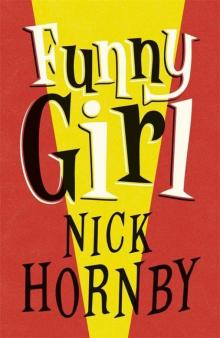 Funny Girl
Funny Girl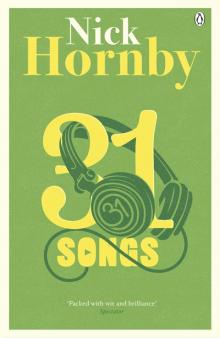 31 Songs
31 Songs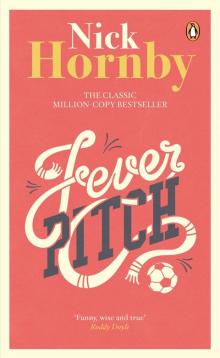 Fever Pitch
Fever Pitch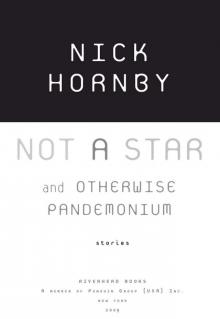 Not a Star and Otherwise Pandemonium
Not a Star and Otherwise Pandemonium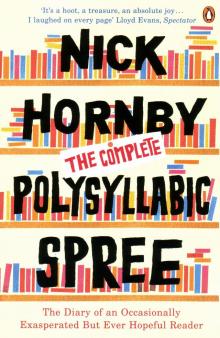 The Complete Polysyllabic Spree
The Complete Polysyllabic Spree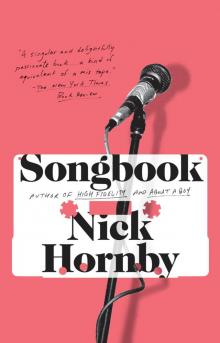 Songbook
Songbook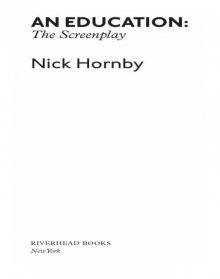 An Education
An Education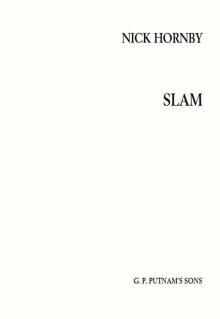 Slam
Slam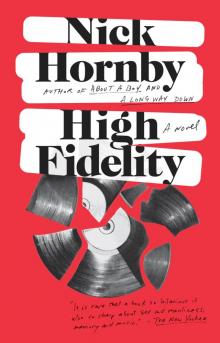 High Fidelity
High Fidelity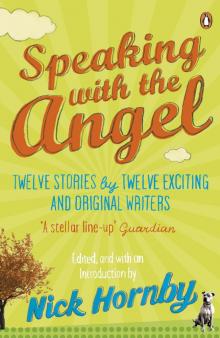 Speaking With the Angel
Speaking With the Angel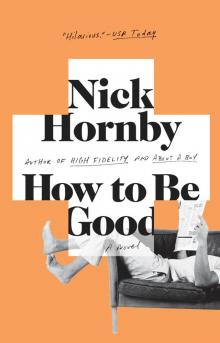 How to Be Good
How to Be Good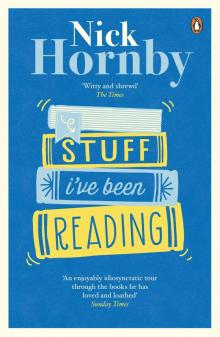 Stuff I've Been Reading
Stuff I've Been Reading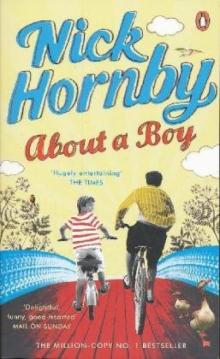 About a Boy
About a Boy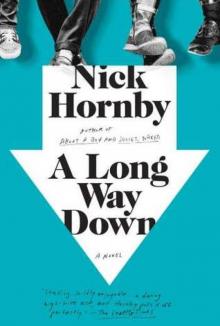 A Long Way Down
A Long Way Down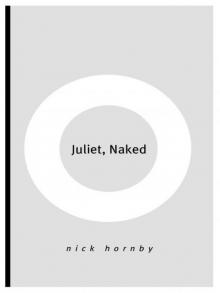 Juliet, Naked
Juliet, Naked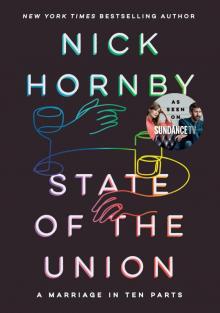 State of the Union
State of the Union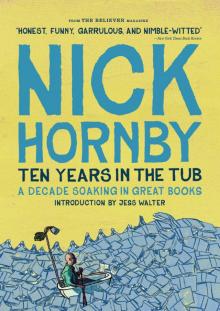 Ten Years in the Tub: A Decade Soaking in Great Books
Ten Years in the Tub: A Decade Soaking in Great Books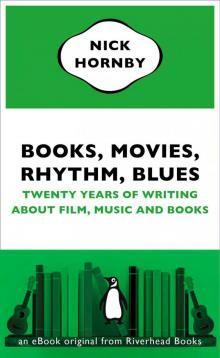 Books, Movies, Rhythm, Blues: Twenty Years of Writing About Film, Music and Books
Books, Movies, Rhythm, Blues: Twenty Years of Writing About Film, Music and Books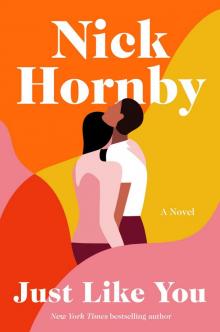 Just Like You
Just Like You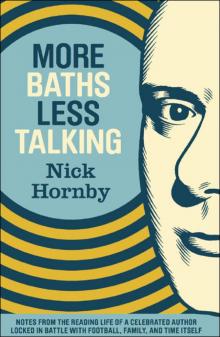 More Baths Less Talking
More Baths Less Talking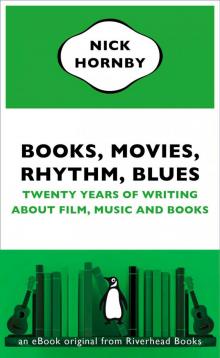 Books, Movies, Rhythm, Blues
Books, Movies, Rhythm, Blues